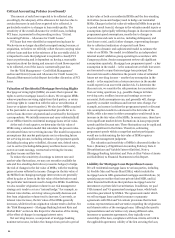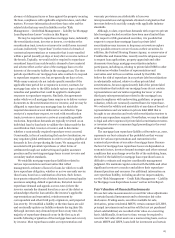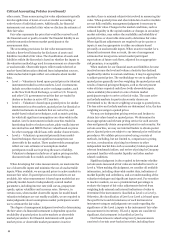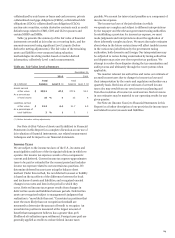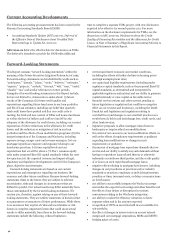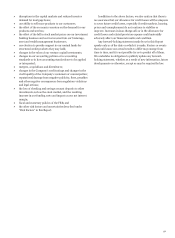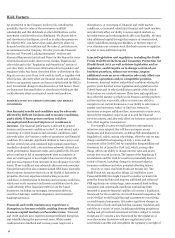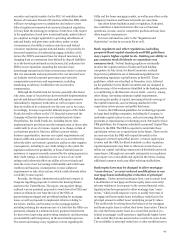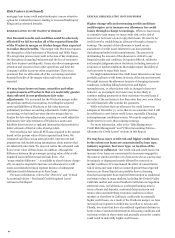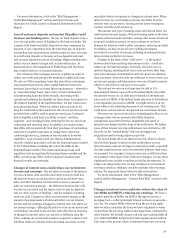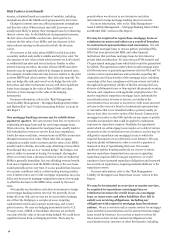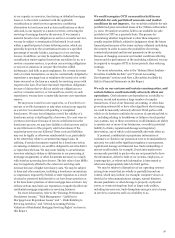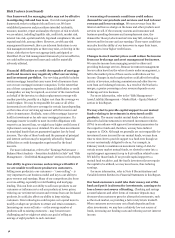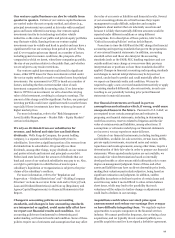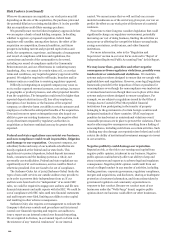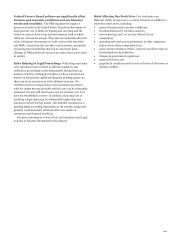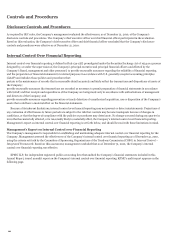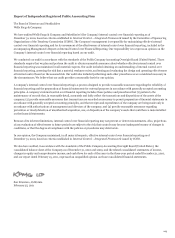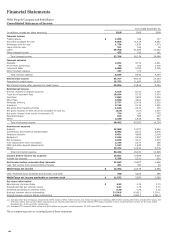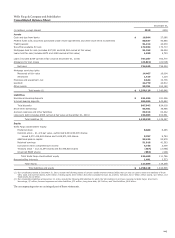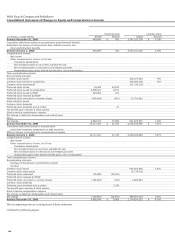Wells Fargo 2010 Annual Report Download - page 98
Download and view the complete annual report
Please find page 98 of the 2010 Wells Fargo annual report below. You can navigate through the pages in the report by either clicking on the pages listed below, or by using the keyword search tool below to find specific information within the annual report.Risk Factors (continued)
income, calculated based on a number of variables, including
assumptions about the likelihood of prepayment by borrowers.
Changes in interest rates can affect prepayment assumptions
and thus fair value. When interest rates fall, borrowers are
usually more likely to prepay their mortgage loans by refinancing
them at a lower rate. As the likelihood of prepayment increases,
the fair value of our MSRs can decrease. Each quarter we
evaluate the fair value of our MSRs, and any decrease in fair
value reduces earnings in the period in which the decrease
occurs.
We measure at fair value prime MHFS for which an active
secondary market and readily available market prices exist. We
also measure at fair value certain other interests we hold related
to residential loan sales and securitizations. Similar to other
interest-bearing securities, the value of these MHFS and other
interests may be negatively affected by changes in interest rates.
For example, if market interest rates increase relative to the yield
on these MHFS and other interests, their fair value may fall. We
may not hedge this risk, and even if we do hedge the risk with
derivatives and other instruments we may still incur significant
losses from changes in the value of these MHFS and other
interests or from changes in the value of the hedging
instruments.
For more information, refer to the “Risk Management –
Asset/Liability Management – Mortgage Banking Interest Rate
and Market Risk” and “Critical Accounting Policies” sections in
this Report.
Our mortgage banking revenue can be volatile from
quarter to quarter. We earn revenue from fees we receive for
originating mortgage loans and for servicing mortgage loans.
When rates rise, the demand for mortgage loans usually tends to
fall, reducing the revenue we receive from loan originations.
Under the same conditions, revenue from our MSRs can increase
through increases in fair value. When rates fall, mortgage
originations usually tend to increase and the value of our MSRs
usually tends to decline, also with some offsetting revenue effect.
Even though they can act as a “natural hedge,” the hedge is not
perfect, either in amount or timing. For example, the negative
effect on revenue from a decrease in the fair value of residential
MSRs is generally immediate, but any offsetting revenue benefit
from more originations and the MSRs relating to the new loans
would generally accrue over time. It is also possible that, because
of economic conditions and/or a deteriorating housing market,
even if interest rates were to fall, mortgage originations may also
fall or any increase in mortgage originations may not be enough
to offset the decrease in the MSRs value caused by the lower
rates.
We typically use derivatives and other instruments to hedge
our mortgage banking interest rate risk. We generally do not
hedge all of our risk, and we may not be successful in hedging
any of the risk. Hedging is a complex process, requiring
sophisticated models and constant monitoring, and is not a
perfect science. We may use hedging instruments tied to U.S.
Treasury rates, LIBOR or Eurodollars that may not perfectly
correlate with the value or income being hedged. We could incur
significant losses from our hedging activities. There may be
periods where we elect not to use derivatives and other
instruments to hedge mortgage banking interest rate risk.
For more information, refer to the “Risk Management –
Asset/Liability Management – Mortgage Banking Interest Rate
and Market Risk” section in this Report.
We may be required to repurchase mortgage loans or
reimburse investors and others as a result of breaches
in contractual representations and warranties. We sell
residential mortgage loans to various parties, including GSEs,
SPEs that issue private label MBS, and other financial
institutions that purchase mortgage loans for investment or
private label securitization. We may also pool FHA-insured and
VA-guaranteed mortgage loans which back securities guaranteed
by GNMA. The agreements under which we sell mortgage loans
and the insurance or guaranty agreements with the FHA and VA
contain various representations and warranties regarding the
origination and characteristics of the mortgage loans, including
ownership of the loan, compliance with loan criteria set forth in
the applicable agreement, validity of the lien securing the loan,
absence of delinquent taxes or liens against the property securing
the loan, and compliance with applicable origination laws. We
may be required to repurchase mortgage loans, indemnify the
securitization trust, investor or insurer, or reimburse the
securitization trust, investor or insurer for credit losses incurred
on loans in the event of a breach of contractual representations
or warranties that is not remedied within a period (usually 90
days or less) after we receive notice of the breach. Contracts for
mortgage loan sales to the GSEs include various types of specific
remedies and penalties that could be applied to inadequate
responses to repurchase requests. Similarly, the agreements
under which we sell mortgage loans require us to deliver various
documents to the securitization trust or investor, and we may be
obligated to repurchase any mortgage loan as to which the
required documents are not delivered or are defective. We may
negotiate global settlements in order to resolve a pipeline of
demands in lieu of repurchasing the loans. If economic
conditions and the housing market do not recover or future
investor repurchase demand and our success at appealing
repurchase requests differ from past experience, we could
continue to have increased repurchase obligations and increased
loss severity on repurchases, requiring material additions to the
repurchase reserve.
For more information, refer to the “Risk Management –
Liability for Mortgage Loan Repurchase Losses” section in this
Report.
We may be terminated as a servicer or master servicer,
be required to repurchase a mortgage loan or
reimburse investors for credit losses on a mortgage
loan, or incur costs and other liabilities if we fail to
satisfy our servicing obligations, including our
obligations with respect to mortgage loan foreclosure
actions. We act as servicer and/or master servicer for mortgage
loans included in securitizations and for unsecuritized mortgage
loans owned by investors. As a servicer or master servicer for
those loans we have certain contractual obligations to the
securitization trusts, investors or other third parties, including,
96


